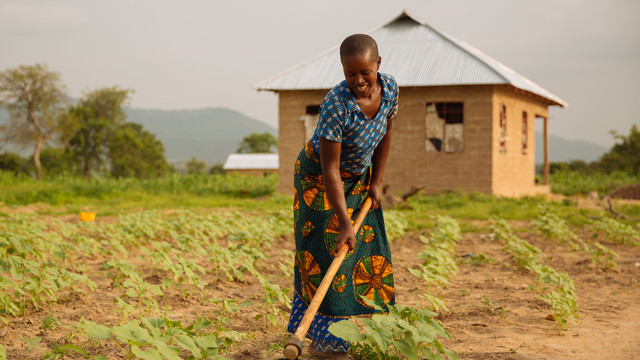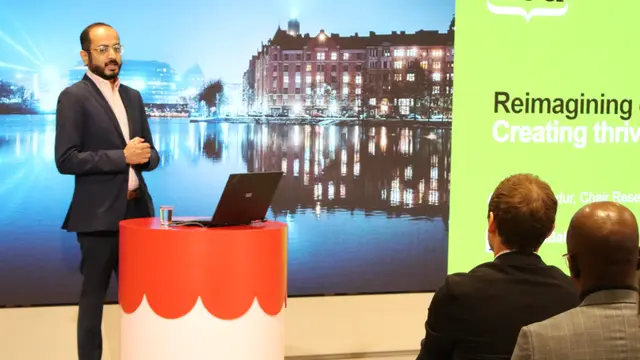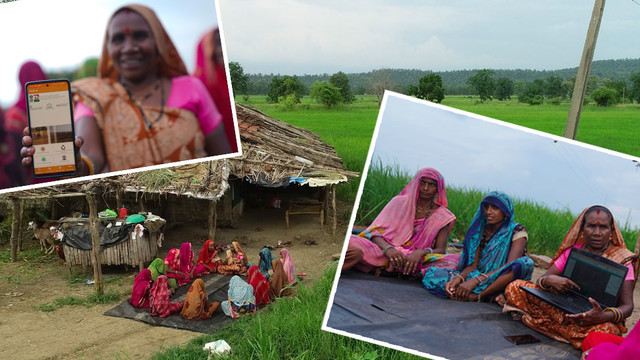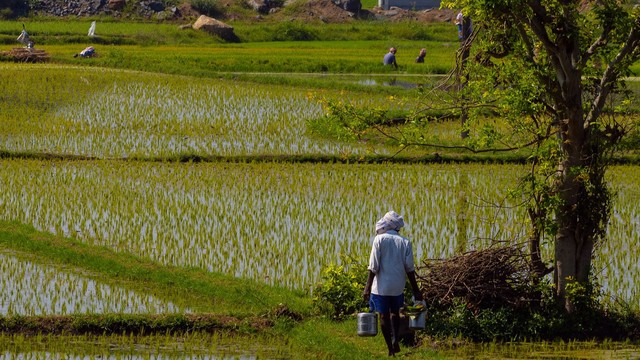
A young climate negotiator from Rwanda, Sandra Isingizwe, practices her media skills ahead of the June 2023 SB58 UN climate change conference in Bonn, Germany (Photo: Jérémy Davis, IIED)
When she assumed the leadership of the Least Developed Countries (LDC) Group in January 2022, Senegal’s Madeleine Diouf Sarr stressed the need for new LDC delegates to have a greater role in UN climate negotiations.
Better known as ‘climate COPs,’ the annual summits held under the UN Framework Convention on Climate Change (UNFCCC) are a critical chance for LDCs to leverage collective influence on their common needs and priorities. With the lowest-income countries suffering first and worst from the impacts of climate change – despite contributing least to its causes – these talks take place in the shadow of a ticking clock. Negotiating teams must be at the top of their game.
But intergovernmental negotiations are complex, jargon-filled and exhausting, and despite their expertise, women are still not well represented or resourced to take part. This inequity inspired the creation of a capacity-building programme to help new UNFCCC delegates – particularly women – gain the confidence and skills they need to achieve better outcomes for their home nations, and all LDCs.
Taking a seat at the table
During 2022, Women’s Environment & Development Organization (WEDO) and IIED ran a programme that supported 11 new LDC negotiators to take part in COP27. The programme supported the new negotiators - who arrived with some relevant experience and plenty of ambition - in two ways:
Providing logistical and technical support, enabling them to:
- Participate at UNFCCC sessions in Bonn (June) and Sharm-El-Sheik (November)
- Draft interventions, analyse and interpret decisions, understand Parties’ positions and the key points of divergence among negotiating groups, and
- Take the floor on behalf of the LDC Group and discuss their positions and concerns with negotiators from other countries and blocs.
Operating a mentoring scheme by:
- Matching each new negotiator with an experienced LDC-delegate mentor who would guide and encourage their development as well as support navigating the UNFCCC process and getting to grips with specific topics
- Enabling mentees to attend thematic sessions and coordination meetings; meet with LDC lead negotiators; report back to their national delegations; become familiar with the dynamics of the UN negotiations and identify relevant actors
- Arranging daily one-to-one meetings in which each mentor supported their mentee to stay engaged and active throughout the weeks of negotiations and preparatory sessions, and
- Organising daily catch-up meetings for the mentees as a group: a space to bond, share experiences, ask questions, share progress and exchange views, challenges and ideas.
IIED and partners also support another highly invested but unrepresented group in the UNFCCC process: young climate negotiators.
From rookie to representative: Sandra Isingizwe’s journey

In 2021, Sandra Isingizwe, an environmental advocate and youth mobiliser working with Rwandan NGO The Green Protector, took a significant step towards adding ‘climate negotiator’ to her impressive skillset.
Her learning journey began in Bonn…
2022
June: Supported by IIED and WEDO, Isingizwe joins UNFCCC negotiations in Bonn, attending negotiation sessions on action for climate empowerment and transparency.
June-November: Diving deeper, Isingizwe joins IIED’s monthly transparency group meetings. Chaired by LDC Group transparency coordinator Yamikani Idriss, these sessions offer a front row seat to negotiators’ discussions on the outcomes from the previous UNFCCC session and preparations for the forthcoming round.
With support from her mentor, Isingizwe also uses this time to prepare more broadly for COP27.
3-5 November: On the eve of negotiating sessions in Egypt, Isingizwe attends a WEDO night school for new negotiators. In the negotiation simulation exercise – the centrepiece of the training – all the participants experience a taste of the pressure and pace of negotiations within a supportive learning environment.

IIED and WEDO organised mock negotiations, and the junior negotiators were able to practice speaking up for the LDC countries on key issues (Photo: Fernanda Alcobe, IIED)
November: At the request of the LDC Group’s lead transparency negotiator – who was facilitating the session and so unable to negotiate –Isingizwe represented the LDC Group for a key agenda item on transparency in climate action monitoring, reporting and verification. This was a daunting task: as lead negotiator representing 46 countries, she tabled the LDC Group’s views and positions and ensured they were considered in the negotiation text. After she took the floor and made her first intervention, the lead transparency negotiator for the G77 and China congratulated her on her performance.
I was scared of not being able to do what they entrusted me to do. And I thought of refusing to do so… I realised that saying no was not an option for me. I got the opportunity to be there, and therefore we are representing billions of people who cannot be in that room.
11 November: Isingizwe represented the group’s views at several further meetings. Parties agreed on a decision text that captured the LDC position: a success for every country heavily impacted by but least resourced to cope with climate hazards. Her fellow mentees, also present as LDC delegates to COP27, actively participated in the discussions.
20 November: Parties agree a decision reflecting the LDC position on transparency presented by Isingizwe.
The LDC Group chair shares her excitement at seeing a new generation of negotiators in action
2023
June: A rookie no more, Isingizwe continued to attend negotiating sessions and was selected in this year’s open call to attend the Bonn sessions in June and COP28 in Dubai.
In Bonn, she had the opportunity to speak on behalf of the LDC Group during negotiations on a transparency agenda item and report back to the LDC Group’s daily coordination meeting. She says these were “scary things to do” - but a big opportunity to continue learning and stepping out of her comfort zone!

Junior negotiators from Francophone countries practice analysing the negotiating texts as part of their training (Photo: Fernanda Alcobe, IIED)
A long and determined friendship
IIED has a long, close history with the LDC Group, working with them to strengthen the group’s position in international climate negotiations and related global forums. We will continue working with partners like WEDO to nurture the next generation of LDC Group climate negotiators.




